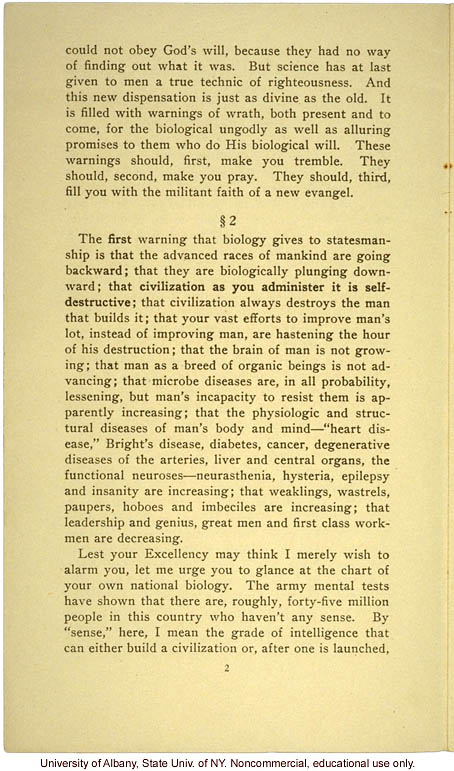"The New Decalogue of Science," by Albert Edward Wiggam (2)

"The New Decalogue of Science," by Albert Edward Wiggam (2)
1351. could not obey God's will, because they had no way of finding out what it was. But science has at last given to men a true technic of righteousness. And this new dispensation is just as divine as the old. It is filled with warnings of wrath, both present and to come, for the biological ungodly as well as alluring promises to them who do His biological will. These warnings should, first, make you tremble. They should, second, make you pray. They should, third, fill you with the militant faith of a new evangel. [section symbol] 2 The first warning that biology gives to statesmanship is that the advanced races of mankind are going backward; that they are biologically plunging downward; that civilization as you administer it is self-destructive; that civilization always destroys the man that builds it; that your vast efforts to improve man's lot, instead of improving man, are hastening the hour of his destruction; that the brain of man is not growing; that man as a breed of organic beings is not advancing; that microbe diseases are, in all probability, lessening, but man's incapacity to resist them is apparently increasing; that the physiologic and structural diseases of man's body and mind - "heart disease," Bright's disease, diabetes, cancer, degenerative diseases of the arteries, liver and central organs, the functional neuroses - neurasthenia, hysteria, epilepsy and insanity are increasing; that weaklings, wastrels, paupers, hoboes and imbeciles are increasing; that leadership and genius, great men and first class work men are decreasing. Lest you Excellency may think I merely wish to alarm you, let me urge to glance at the chart of your own national biology. The army mental tests have shown that there are, roughly, forty-five million people in this country who haven't any sense. By "sense," here, I mean the grade of intelligence that can either build a civilization or, after one is launched, 2 [end]
- ID: 11316
- Source: DNALC.EA


